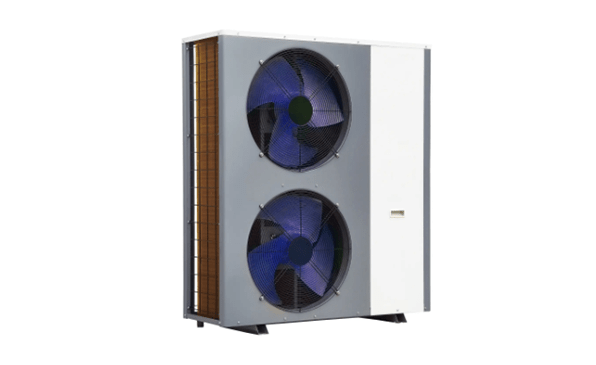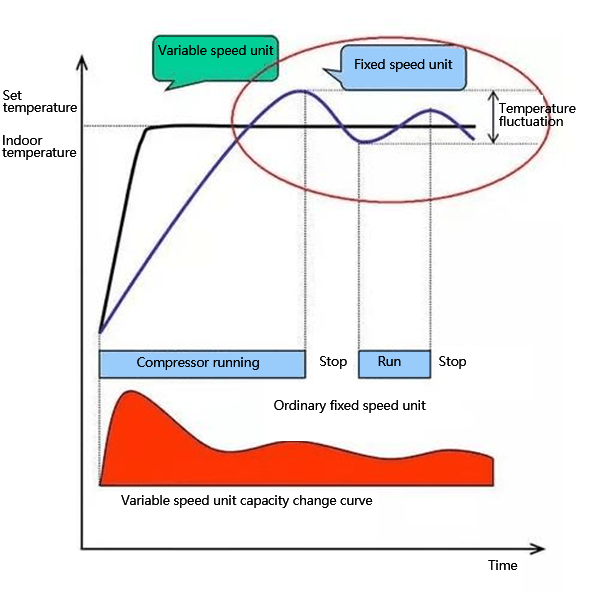
Figure 1: Heat pump unit.
A variable speed heat pump is a heating and cooling system that can adjust its output based on the needs of your home. Unlike traditional HVAC systems, which operate at a fixed speed, variable speed heat pumps can vary their output to match the exact requirements of your space. This technology has revolutionized the way we heat and cool our homes, providing greater comfort, efficiency, and cost savings.
In this article, we'll explore what a variable speed heat pump is, how it works, and the benefits it can offer for your home.
1. What is a Variable Speed Heat Pump?
A variable speed heat pump is a type of HVAC system that uses a variable speed compressor to adjust the amount of heating or cooling provided to your home. This means that the system can operate at different speeds depending on the temperature outside, the size of your home, and other factors. Variable speed heat pumps are also known as inverter heat pumps because they use an inverter to control the compressor speed.

Figure 2: Mitsubishi inverter compressor.
2. How Does a Variable Speed Heat Pump Work?
Variable speed heat pumps work by using a compressor that can vary its speed to meet the heating or cooling needs of your home. The compressor adjusts its output by using a sensor that detects the temperature inside and outside your home. Based on this information, the system will adjust the speed of the compressor to provide the optimal level of heating or cooling.
The advanced controls and sensors used by variable speed heat pumps can optimize the performance. These controls can adjust the operation of the system based on factors such as outdoor temperature, indoor temperature, and humidity levels.

Figure 3: Air source heat pump.
3. Benefits of a Variable Speed Heat Pump
● Energy Efficiency: Variable speed heat pumps are known for their energy efficiency. By adjusting their output based on the specific needs of your home, they can use less energy than traditional HVAC systems, which can result in lower energy bills and reduced environmental impact.
● Consistent Temperatures: Because variable speed heat pumps can adjust their output based on the specific heating or cooling needs of your home, they can provide consistent temperatures throughout the year. This helps to eliminate hot and cold spots in your home, which can result in greater comfort.
● Improved Air Quality: Variable speed heat pumps can also improve the air quality in your home. By running at a lower speed, they can provide greater air filtration and reduce the amount of dust and allergens in the air.
● Quiet Operation: Variable speed heat pumps are designed to operate at lower speeds at most times, which means that they can run more quietly than traditional HVAC systems. This can be a big advantage for homeowners who want a heating and cooling system that won't disturb their daily activities.
● Long Lifespan: Variable speed heat pumps are designed to operate at lower speeds, which can reduce wear and tear on the system. This can result in a longer lifespan and reduced maintenance costs over time.

Figure 4: Variable speed vs fixed speed heat pump on heat exchange.
4. Is a Variable Speed Heat Pump Right for Your Home?
A variable speed heat pump can be a great choice for homeowners who want an energy-efficient, reliable, and comfortable heating and cooling system. However, the decision to install a variable speed heat pump will depend on a variety of factors, including the size of your home, your budget, and your specific heating and cooling needs.
To determine whether a variable speed heat pump is right for your home, it's a good idea to consult with a professional HVAC contractor. They can assess your home and recommend the best heating and cooling system for your specific needs and budget.
5. FAQs
5.1 Are Variable Speed Heat Pumps Worth It?
Variable speed heat pumps can be worth the investment for homeowners who prioritize energy efficiency, consistent temperatures, improved air quality, quiet operation, and a long lifespan.
While the upfront cost of a variable speed heat pump may be higher than traditional HVAC systems, the long-term savings on energy bills and reduced maintenance costs can make it a cost-effective option.
Additionally, variable speed heat pumps can provide greater comfort and convenience for homeowners, as they can adjust their output based on specific heating or cooling needs. Ultimately, the decision to invest in a variable speed heat pump will depend on a homeowner's specific needs and budget.

Figure 5: Air conditioner.
5.2 Do Variable Speed Heat Pumps Save Money?
Variable speed heat pumps can save money on energy bills compared to traditional HVAC systems. By adjusting their output based on specific heating or cooling needs, variable speed heat pumps can use less energy and operate more efficiently, resulting in lower energy bills.
Additionally, the longer lifespan of variable speed heat pumps and reduced maintenance costs can also save money over time compared to traditional HVAC systems. However, the actual amount of money saved will depend on factors such as the size of the home, the efficiency of the system, and local energy costs.
5.3 What is the Difference between Standard and Variable Speed Heat Pumps?
Standard heat pumps operate at a fixed speed, meaning that they always provide the same amount of heating or cooling output. In contrast, variable speed heat pumps use a variable speed compressor to adjust its running speed based on the specific heating or cooling needs of the home.
This allows them to provide more precise and efficient heating and cooling, resulting in greater comfort and energy savings. Additionally, variable speed heat pumps can operate more quietly and have a longer lifespan than standard heat pumps.

Figure 6: Variable speed heat pump unit vs fixed speed unit.
5.4 Is a Variable Speed Heat Pump Better than 2 Stage?
It's difficult to say whether a variable speed heat pump is better than a two-stage heat pump, as they both have their own advantages and disadvantages.
A variable speed heat pump can provide more precise and efficient heating and cooling, resulting in greater comfort and energy savings. They also operate more quietly and have a longer lifespan compared to two-stage heat pumps.
On the other hand, two-stage heat pumps are generally less expensive and can provide better heating performance during extremely cold weather. Ultimately, the choice between a variable speed and two-stage heat pump will depend on the specific needs of the home and the preferences of the homeowner.
Related Info
Ducted Heat Pumps: Everything You Need to KnowHow Does a Ductless Heat Pump Work? A Comprehensive Guide
Ducted vs Ductless Heat Pump: Which One is Right for You?
Heat Pump vs Central Air: Which One is Right for You?
Heat Pump vs Conventional HVAC: Which is Better for Your Home?


